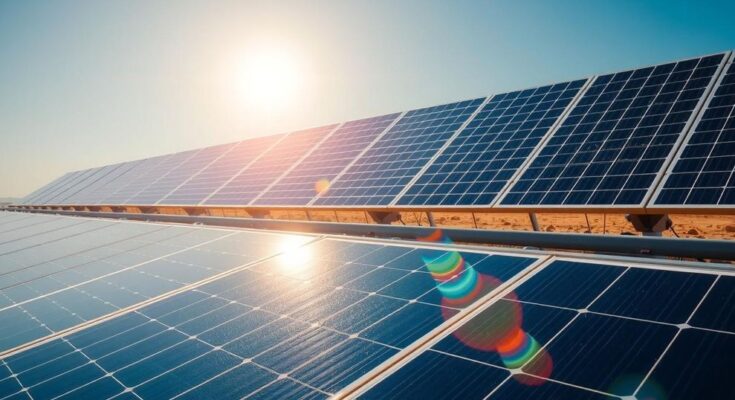Tunisia has signed contracts for four solar projects totaling 500 MW, part of a larger 1.7 GW tender. The projects, expected to start operations by 2027, will generate 1 TWh annually, contributing around 5% to Tunisia’s electricity supply. Winning bids include installations developed by Qair International, Scatec, and Voltalia, along with upcoming wind energy projects. Overall, these developments reinforce Tunisia’s dedication to renewable energy.
Tunisia has made significant strides in its pursuit of renewable energy by signing contracts for four solar photovoltaic projects, amounting to a total capacity of 500 megawatts (MW). These initiatives represent a crucial segment of a broader 1.7 gigawatt (GW) tender and are anticipated to commence operations by 2027. It is projected that these solar projects will yield approximately 1 terawatt-hour (TWh) per annum, contributing around 5% to the country’s electricity supply.
The contracts awarded encompass three solar installations, each with a capacity of 100 MW, to be executed by renowned energy companies Qair International, Scatec, and Voltalia. These installations will be strategically positioned in El Ksar (Gafsa), Mezzouna (Sidi Bouzid), and Menzel Habib (Gabes). Moreover, Qair International has been granted an additional project of 198 MW in Sidi Bouzid, further cementing its footprint in Tunisia’s energy landscape.
In addition to solar initiatives, Tunisia’s Ministry of Industry, Mines, and Energy has unveiled intentions to invite bids for two wind energy projects, each boasting a capacity of 75 MW, with a target date set for March 2025. This complements the existing groundwork laid for two 10 MW solar projects in Kasserine Governorate, which are being developed by Qair and Mazarine. Furthermore, Scatec, in partnership with Aeolus, a subsidiary of Toyota, is currently overseeing the construction of a 50 MW solar facility in Tozeur, valued at approximately TND 135 million.
Through these various projects, Tunisia is demonstrating considerable commitment and advancement towards achieving its renewable energy objectives, solidifying its role as a prominent participant in the regional energy transition.
Tunisia is actively enhancing its renewable energy sector to reduce dependency on fossil fuels and address energy sustainability. The country has set ambitious targets to increase its renewable energy generation capacity, aiming for 30% of its total energy mix to derive from renewable sources by 2030. The signing of contracts for solar photovoltaic projects constitutes a decisive step in this overarching plan, reflecting both governmental support and international investment in Tunisia’s energy transition.
In conclusion, Tunisia’s recent contracts for solar photovoltaic projects denote a strategic advancement in its renewable energy sector. With 500 MW of new solar capacity planned and additional wind projects on the horizon, Tunisia is positioned to significantly enhance its energy supply and sustainability by the set target year of 2027. These initiatives not only reflect a commitment to environmental goals but also underscore the country’s potential as an influential player in the regional energy landscape.
Original Source: solarquarter.com




